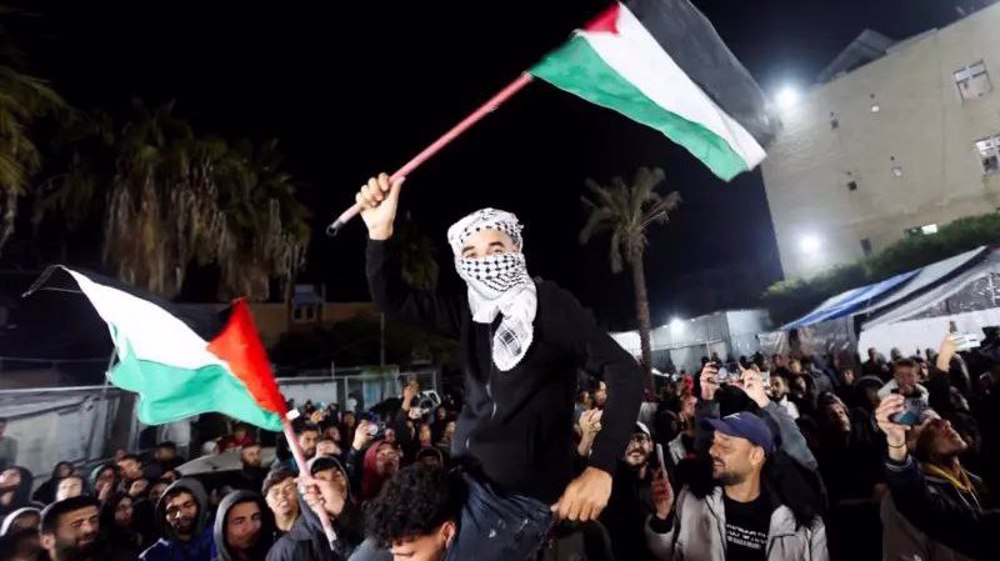Iran says any form of foreign interference undermines stability of Hong Kong
Iran’s Foreign Ministry spokesman has dismissed any form of foreign interference in Hong Kong’s internal affairs, saying that such measures will undermine the stability of the Chinese territory.
Saeed Khatibzadeh’s remarks came on Thursday after the National People's Congress (NPC), China's most powerful state body, adopted a decision on improving the electoral system of the Hong Kong Special Administrative Region (HKSAR).
The decision was passed by an overwhelming majority vote at the fourth session of the 13th NPC and is seen as another major step taken to improve the HKSAR's legal and political systems since the Law on Safeguarding National Security in the HKSAR was adopted in June 2020.
“We respect China’s sovereign decision. The Hong Kong Special Administrative Region is part of China’s territorial integrity. Therefore, all its affairs are related to China, which has shown in the past years that it is committed to "one country, two systems" principle,” the Iranian spokesman said.
He added that the law passed by China’s National People’s Congress is in line with the powers invested in this institution, adding, “Therefore, any foreign interference in China’s internal affairs will naturally undermine stability in Hong Kong and should be rejected.”
On Monday, Beijing lambasted any interference in the internal affairs of Hong Kong, emphasizing the “one country, two systems” principle.
“Hong Kong is China's Special Administrative Region and its affairs are an integral part of China's internal affairs, which allow no interference by any country, organization, or individual,” Chinese Foreign Ministry spokesman Zhao Lijian said at a press conference at the time.
Last month, Belarus, as a representative of 70 countries at 46th session of the United Nations Human Rights Council (UNHRC) delivered a joint statement reiterating support for China's implementation of the “one country, two systems” principle.
In June 2019, unprecedented anti-government protests began in Hong Kong over a proposed extradition bill. It was shelved under pressure from rallies later on, but the turbulent demonstrations continued the next several months and became more violent, endangering the lives and property of citizens.
The protesters have been demanding Hong Kong’s full secession since then. Beijing says the US and the UK have been fanning the flames of the unrest in the semi-autonomous hub by supporting the separatist protesters.
In May last year, Hong Kong’s legislature debated and passed a Beijing-proposed bill, criminalizing sedition, secession, and subversion against the mainland. The law drew harsh criticism from some Western governments, particularly the US and the UK, which claim that the law threatens the semi-autonomous stance of the city.
Beijing, however, insists that the new law does not pose a threat to Hong Kong’s autonomy and the interests of foreign investors, noting that it is merely meant to prevent terrorism and foreign interference there, which were evident in the violent riots in 2019.
In response to the imposition of the new security law, former US president Donald Trump last year signed an executive order to end the preferential economic treatment of the semi-autonomous city to punish China for what he called “oppressive actions” against the former British colony.
It marked a new low in relations between the two countries, which have worsened in recent years over a range of issues, including trade, the South China Sea, arms sales to Taiwan, and the coronavirus pandemic.
Hamas hails Gaza’s victory over Israel in genocidal war, its forcing enemy to agree to ceasefire
'Capitulation': Israeli officials and media concede Gaza defeat as truce unfolds
'Gaza has won': Social media users react to ceasefire with mix of relief, joy
Iran seeks South Korea’s assistance for AI, fiber-optic projects
VIDEO | Iran's 'Eqtedar' (Power) maneuver
Israel hits HTS military target in Syria for 1st time since fall of Assad
VIDEO | Press TV's news headlines
Israel has slaughtered 13,000 students in Gaza, West Bank












 This makes it easy to access the Press TV website
This makes it easy to access the Press TV website